Passing the baton to the new generation of human rights advocates in Kosovo
When OSCE staff in Kosovo got together in 2019 to find ways to pass their expertise on to young women and men in the area, they did not anticipate the success their idea would bring about. Two years later, the Youth Academy is expanding, despite some challenges along the way.
The initiative started with Giovanni Corbo, Hana Dogović, Josip Ivanović, and Šehida Miftari, working in the Property, Cultural Heritage and Inter-religious Dialogue, Communities, and Law and Justice sections of the OSCE Mission in Kosovo. Their ideas quickly took shape and in September 2019, they organized the first Youth Academy: a space where young people could learn about human rights from different perspectives and discuss issues of their concern and interest.
Although the OSCE Mission ‘youth team’ began this undertaking with great enthusiasm, the feedback exceeded their expectations, with around 80 young women and men from across Kosovo attending the first edition.
“We were pleasantly surprised as we did not even advertise the call back then, we just spread the word through our colleagues in the field,” remembers Šehida Miftari, from the Law and Justice Section.
Going beyond in-house expertise
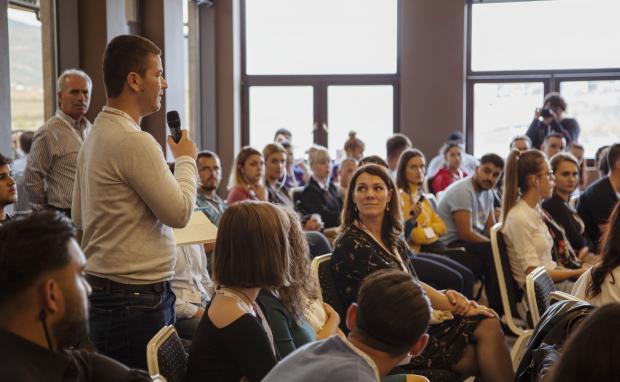
To match the interest, they expanded the curricula and invited international experts, youth activists, representatives of human rights organizations, civil society, political structures and the judiciary and other Kosovo experts, providing thus different perspectives on the topic.
“We planned every detail,” Miftari continues. “We had plenary sessions focused on issues of common interest like gender equality and youth participation in decision making, as well as tailored workshops and training on human rights cases for law students designed by the Law and Justice Section. There were also training sessions on violent extremism that leads to terrorism,youth activism and gender organized by colleagues from the other sections."
While the focus of the Academy was to learn, the organizers also left room for more relaxed interactions.
“We had absolutely lively and inspiring discussions with scholars from renowned universities, but also fun activities, which included visits to cultural sites, bowling sessions and a live music concert, essential to breaking barriers and creating lasting networks between young people from different communities,” adds Josip Ivanović and Sabrina Salis, Chief of the Property, Cultural Heritage and Inter-religious Dialogue Section.
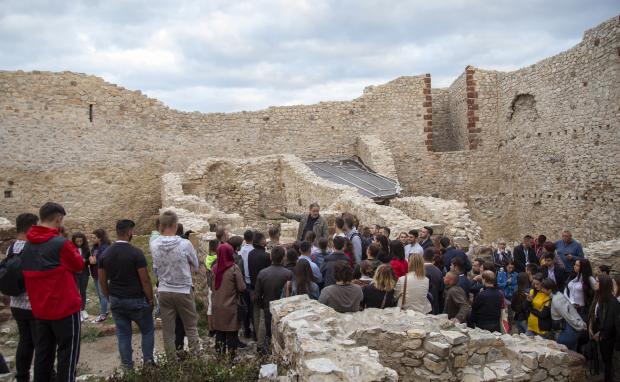
Switching to online format
This was all before the COVID-19 pandemic. When the first cases of coronavirus infections in Kosovo were registered in March 2020, the team was in full swing preparing for the second Youth Academy.
“We faced many uncertainties, and in the end, we had to move everything to the online format. Of course it was a major challenge. A big part of the whole activity is the direct interaction between speakers and attendees, and among attendees of different ethnicities, religions and professional backgrounds. But after seeing the impact of the first edition, cancelling was not an option, so we made it work,” Miftari explains.
Despite the worries, the online format did not diminish the interest of young people to attend. The second edition, held completely virtually, included over 50 participants selected on the basis of an open call. Additionally, an impressive list of trainers and speakers from Vienna University were onboard, as well as local experts, including the Ombudsperson and civil society activists.
Miloš Vučinić, a 24-year-old student of Masters in English Language and Literature from Mitrovica/Mitrovicë North was one of the participants. He says that although he was sad that the Academy would be held online, , it did not stop him from enjoying it and being an active member.
“The Academy was a unique opportunity to hear from interesting speakers from different European universities and learn about human rights from them. It brought the subject of human rights closer to me and helped me strengthen the knowledge about how to protect them,” he says.
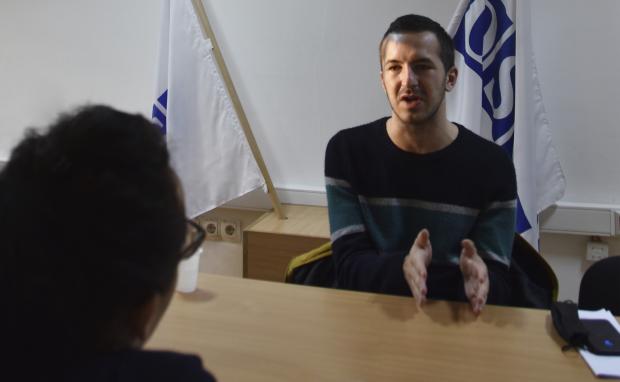
Spreading human rights awareness
As he was attending the Academy, Vučinić was already getting ideas about sharing the knowledge he was acquiring. As a volunteer with the Mitrovica/Mitrovicë North NGO “Podrži Me” [Support Me] in which works with children with disabilities and their families, Vučinić saw that there was not enough awareness among parents about who to address if the rights of their children are violated.
With OSCE’s support, Vučinić also got in touch with the NGO Handikos working with people with disabilities in Mitrovicë/Mitrovica South, and brought Kosovo Albanian and Kosovo Serb parents of children with disabilities together.
“All parents of children with disabilities share common problems. Besides having the Ombudsperson talk to them about the institutions’ responsibilities, the parents shared their experiences. It was very interesting to see parents from both communities voice their struggles and realize that they share the same challenges both in the south and north.”
Follow up with a support system
The journey continued, with the third edition of the Youth Academy held in September and October 2021.
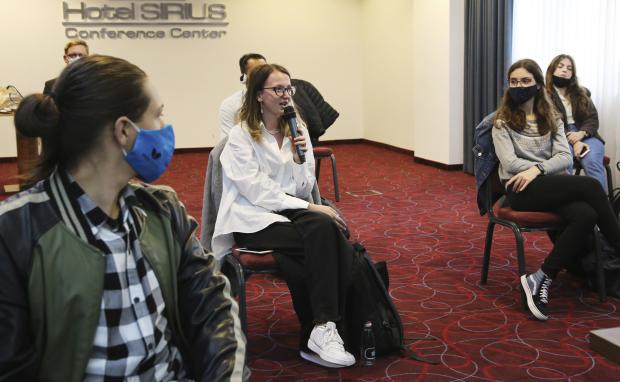
To Agmie Osmani, a 25-year-old psychologist from Prishtinë/Priština who participated in the third edition, the Academy gave a new perspective on how to defend human rights in a more structured and professional manner, not just from good will. Following many years of volunteering at a shelter for victims of domestic violence, she founded an NGO in 2021 called ‘Follow-up”, seeing that what was missing the most in helping victims of domestic violence was precisely that - the follow up.
“These women cannot stay at the shelter forever, and there was no support system available once they left. I wanted to be that bridge between the institutions and the marginalized groups. What I did as a volunteer, visiting and speaking to different businesses in order to find work for the victims so that they become self-sustainable, I want to do through my NGO and the skills I gained at the Academy,” she says.
Osmani points out that the Academy was an eye-opener in terms of international trainers sharing practices they use. “For example, a trainer explained in-depth why there is discrimination against women and it helped me see how to tackle that in a different way,”, she explains.
According to Miftari, both Vučinić’s and Osmani’s enthusiasm and concrete work on promoting and protecting human rights is inspiring. “We have come a long way since we started in 2019, despite the challenges with the pandemic. The ambition and engagement of the young people we have the chance to meet and work with through the Academy makes it so worthwhile.”
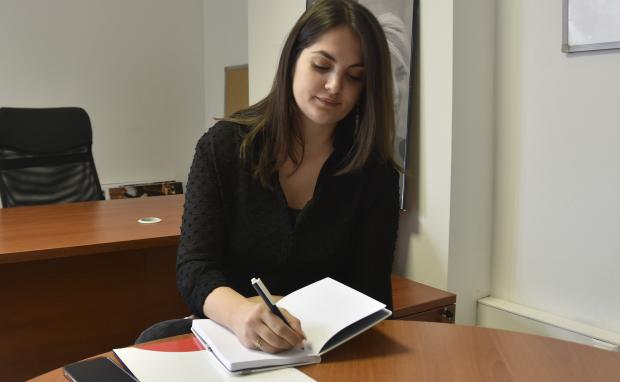
One step further
The Academy is not the end of the journey for these young human rights enthusiasts. Osmani recently discovered that she will be part of another project implemented by the OSCE Mission in Kosovo - the Pool of Trainers (PoT) – a network of young human rights activists who will become certified human rights trainers in their communities.
A few of the previous participants will attend the next Academy, to be held in Autumn 2022, this time as panelists sharing their experiences, while some PoT members will deliver part of the training.
"We are growing together with them and we are very excited to see them reach far," concuded Miftari.
